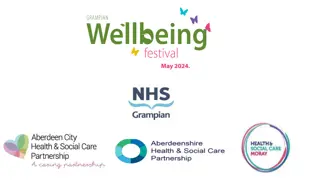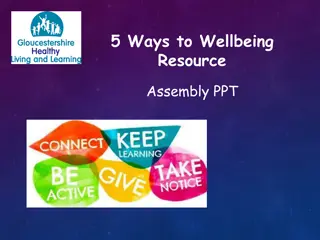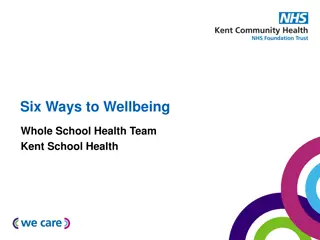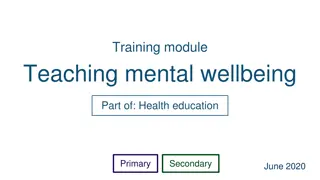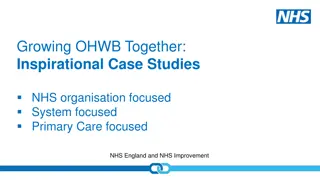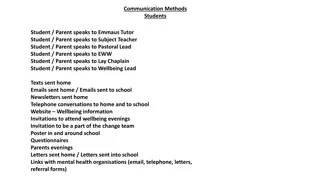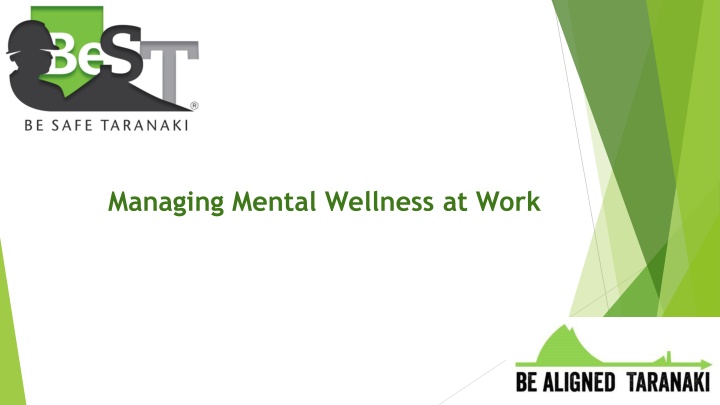
Effective Strategies for Enhancing Mental Wellness at Work
Discover practical tips for fostering mental wellbeing in the workplace, including key indicators to watch out for, suggestions for creating a supportive environment, and actionable steps to help individuals struggling with mental health challenges. Learn how to initiate conversations, incorporate mental health awareness into the workplace culture, and utilize available resources to promote a healthier work environment.
Download Presentation

Please find below an Image/Link to download the presentation.
The content on the website is provided AS IS for your information and personal use only. It may not be sold, licensed, or shared on other websites without obtaining consent from the author. If you encounter any issues during the download, it is possible that the publisher has removed the file from their server.
You are allowed to download the files provided on this website for personal or commercial use, subject to the condition that they are used lawfully. All files are the property of their respective owners.
The content on the website is provided AS IS for your information and personal use only. It may not be sold, licensed, or shared on other websites without obtaining consent from the author.
E N D
Presentation Transcript
Mental wellbeing is not a matter of luck but a matter of design. It requires a deliberate effort to control psychosocial risks and build in the protective factors associated with good work . Dr Hillary Bennett Director, Leading Safety This Photo by Unknown Author is licensed under CC BY
Inhouse Risk Assessment The following is a list of factors that can hinder CEO's and organisations from getting to grips with the challenge of protecting mental wellbeing. CEOs should complete the check list themselves, and also with their leadership teams. The leadership team can then reflect on what mindsets and practices could be holding them back.
https://besafe.nz/wp- content/uploads/2021/09/Protec ting-Mental-Wellbeing-at-Work- July-2021.pdf This Photo by Unknown Author is licensed under CC BY-SA
Key Indicators when struggling with Mental Wellbeing Sleep or appetite changes Apathy Feeling disconnected Mood changes Withdrawal Illogical thinking Drop in functioning Nervousness Unusual behavior Problems thinking Increased sensitivity This Photo by Unknown Author is licensed under CC BY-SA-NC
What can you do to help? Have a conversation in a neutral place or while doing an activity such as going for a walk, fishing or sports practice Ensure no interruptions Focus on the individual Use open questions, with neutral language eg how are you doing today You seem low today Give them time to answer Have a follow up meeting Utilise any assistance your workplace offers
Suggestions to incorporate into the workplace Talk about and normalize conversations about mental health Utilise free online e learning modules https://mentalhealth.org.nz/workplaces/ope n-minds-e-learning Share free Apps such as ex All Black John Kirwin s Mentemia and consider joining as a business https://www.mentemia.com/nz/home Mental health self-assessment tools Offer free or subsidized clinical screenings Offer health insurance Provide free or subsidized lifestyle coaching Distribute materials
Host seminars or workshops that address depression and stress Create and maintain dedicated, quiet spaces for relaxation activities Provide managers with training to help them recognize the signs Give employees opportunities to participate in decisions Create a buddy system Employee Assistance Programme counselling support service.
Remember Work breaks are for quality time out from work Smoko rooms are not an office so people having a break should not be interrupted with work things.
Where to go for help National helplines Need to talk? Free call or text 1737 any time for support from a trained counsellor. Lifeline 0800 543 354 (0800 LIFELINE) or free text 4357 (HELP). Suicide Crisis Helpline 0508 828 865 (0508 TAUTOKO). Healthline 0800 611 116 Samaritans 0800 726 666
Depression-specific helplines Depression Helpline 0800 111 757 or free text 4202 (to talk to a trained counsellor about how you are feeling or to ask any questions). www.depression.org.nz includes The Journal online help service. SPARX.org.nz online e-therapy tool provided by the University of Auckland that helps young people learn skills to deal with feeling down, depressed or stressed. Anxiety NZ 0800 269 4389 (0800 ANXIETY) This Photo by Unknown Author is licensed under CC BY





